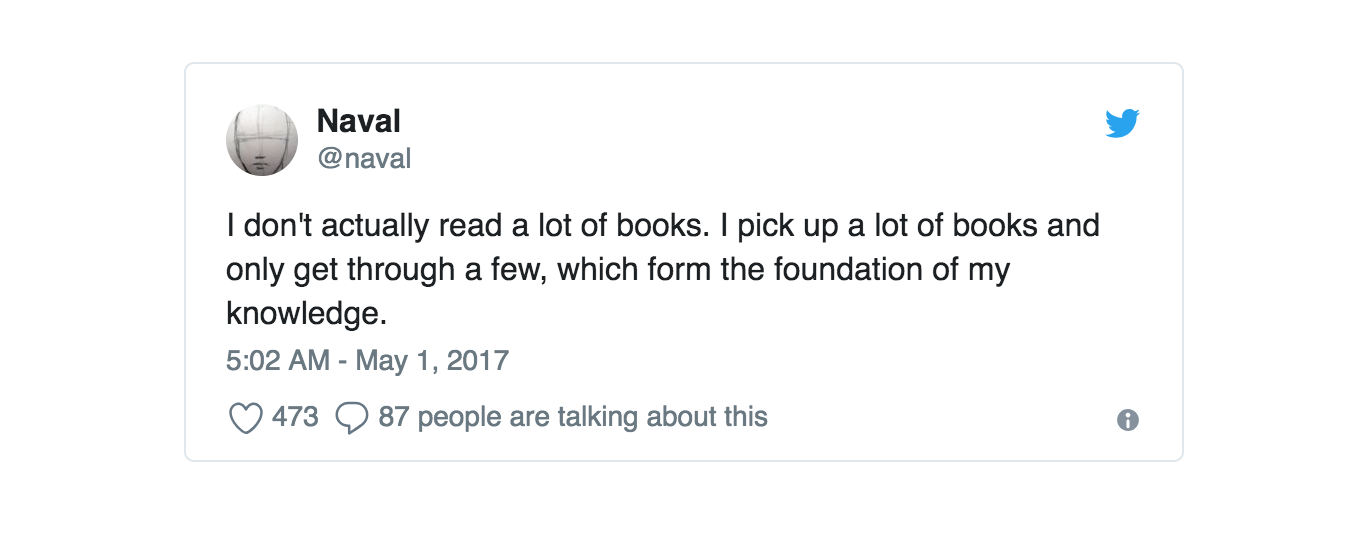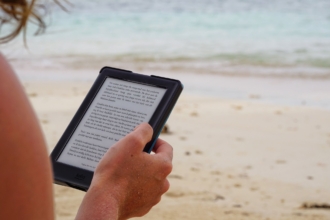Reading is trending.
The internet’s taken something uncool and given it a makeover.
Reading is the new kale: worth stomaching because it’s Good For Us.
So good, in fact, that we should do as much of it as we can. More is more! Everyone should be reading one book a week — no, wait, one book a day.
That’s why Mark Zuckerberg, Bill Gates and Elon Musk are successful, after all.
The more we read, the smarter we’ll get.
But where to find the time? We have to do it faster, faster, and faster still!
Blog posts tell us How To Read 300% Faster In 20 minutes! Or, How To Trick Yourself Into Reading More Books!
Speed reading has become a competitive sport: a race to see who can devour the New York Times Bestseller list quickest.
Reading is one of my greatest pleasures. Indeed, I have often shared how learning from others has helped me to bootstrap Jotform to 4 million users.
But all this stuff about speed, targets and numbers?
The truth about speed reading
Speed reading has recently picked up, well, speed, but it’s been around for decades.
President Kennedy could supposedly read about 1,200 words a minute. It later transpired that he made that number up.
According to the 1990 edition of the Guinness Book of World Records, Howard Berg could read over 80 pages of text per minute. But reading specialist Mark Pennington clarified this was a lie that Guinness failed to check.
And that’s not all. Research has consistently debunked speed-readers claims, and science offers an equally strong rebuttal.
As the professor and eye tracking researcher Keith Rayner explains, techniques like simultaneously reading large segments of the page aren’t biologically or psychologically possible, due to the limitation of our foveal viewing area.
An entire page can’t be read at once. Zig-zagging down one page doesn’t work. The human eye just isn’t up to it.
And those apps that claim to increase your reading speed by displaying one word at a time? Creators say “only 20% of the reader’s time is spent processing content while 80% of the time is spent moving the eyes.”
But there’s a fundamental flaw in this logic. We don’t stop thinking when our eyes move, so 100% of our time is spent processing content, while our eyes only move 10% of the time.
And according to UCLA psychologist Patricia Greenfield, when the brain skims, less attention and time is allocated to slower, more time-consuming processes, like inference, critical analysis and empathy.
In other words, we aren’t giving ourselves enough time to grasp complexity or develop opinions of our own.
As reading speed increases, our comprehension drops.
So, speed-reading helps — if the goal is just to scan the text: perhaps for a shopping list or a seating plan.
But we won’t be able to take the information in. Which defeats the entire point of reading.
Or, to quote Woody Allen:
“I took a speed-reading course where you run your finger down the middle of the page and was able to read War and Peace in 20 minutes. It’s about Russia.”
The 100 book myth
Even if we assume speed reading doesn’t really work, we still need to address the real question is: why would we want it to?
I have nothing against reading 100 books a year — if that rate comes naturally to you.
People have different reading speeds and levels of comprehension. But reading to level up on some arbitrary number from the internet?
Firstly, books aren’t created equal — thousands of them just aren’t worth reading.
There are books that resonate with some and scoop up accolades but will bore others to tears.
And there are remarkable, beautifully-written, insightful, books. Do they deserve to be sped-read?
No.
These books are meant to be pored over, savored, corners left dog-eared, passed on to friends and passed back again.
Why would we give one of life’s greatest enjoyments a KPI, a deadline, a target? Our world is already full of rules and benchmarks — do we need to regulate this too?
Here’s what happens when you read for the sake of reading:
You barely retain any of the knowledge.
You sacrifice reflection and introspection.
You absorb very little.
It’s true that reading widely is something many successful people have in common. Successful people tend to be curious about the word they live in.
But it’s not about how much they read. It’s about how they read.
Why do we read, anyway?
Consider three types of reading:
The first is passive. Scrolling on Facebook, flicking through a magazine in a doctor’s room, tapping away on Twitter. This reading happens to you.
The second is practical. Reading for a purpose. Because we want — or need — to learn something. At school, college, or for personal improvement.
The third is pleasurable. Not just fiction or magazines or fluffy escapism. Reading for pleasure doesn’t have a category: it’s subjective. It happens when something makes you tick: an article, a novel, an autobiography.
Reading because you want to, not because you feel you should.
When you can’t put a book down. When your brain fizzes with satisfaction as you turn each page. While you eat, in the bath, on a park bench, standing up on the subway. Devouring a plotline, a theory, a method.
Thinking “Yes — this is for me.” Getting so lost that you don’t hear the doorbell ring.
It’s this reading that lengthens our attention spans, expands our vocabulary, and help us squirrel away golden nuggets of information. We can’t help it — when reading is pleasurable, the content stays with us.
But when we read out of duty, it may melt away — the same way we forget what we’ve learned after a boring exam.
(If we’re reading to relax, this doesn’t matter).
But, if we’re reading 100 books a year in the pursuit of self-improvement, it does.
Personal development books are only as helpful as the action we take after reading them. All the methodologies and frameworks in the world won’t impact us if we can’t process them properly.
Elon Musk and co., attribute their success to reading because they read purposely, and apply that learning in the wider context of their careers. They didn’t plough through huge volumes of material as a box to be ticked.
Reading counts when it’s retained and put into practice.
As Mortimer J. Adler wrote:
“In the case of good books, the point is not to see how many of them you can get through, but rather how many can get through to you.”
In case you choose quality over quantity, here are a few tips that can help you to find books that can get through to you:
Try the classics…
Try dropping self-help books for a while. Most books are repackaged versions of a handful of classics. It’s worth starting with the original wisdom and going from there. Choose the best of the best in the topics that interest you. Reading a selection of these, carefully, will take you far.
…But don’t be too hard on yourself
There’s a notion that some books are ‘guilty pleasures’, only to be read on holiday or in the privacy of the bath. We feel reading isn’t ‘working’ unless it’s challenging or slightly tedious. Books should impress others at dinner parties.
But reading should feel like a privilege, not a chore.
Life’s too short to endure books you don’t really enjoy. Read what you love, in the genres you love, from the authors you love.
Be selective
There will naturally be some books that apply to you and your life more than others. That’s ok. Curate a selection that makes sense for you.
Going deep into one subject that fascinates you will do far more than spreading yourself over someone else’s top 10.
Don’t feel obliged to buy a novel because it was on the bestseller list. Follow your nose and read widely in areas that are relevant, and matter, to you.
Re-read
I find myself returning again and again to the same books. They feel like the coziest pairs of worn-in jeans. And every time I re-read them, I notice something new.
“I don’t want to read everything. I just want to read the 100 great books over and over again.” — source
If you’re trying to expand your knowledge in a certain area, re-reading something that inspired and resonated with you will be more impactful than reading new books that reiterate the same content.
Take notes
We retain information much better when we take notes manually. If your book is physical (and not borrowed) highlight sections, scribble notes. This helps you to process and interpret the content in a more meaningful way.
Join a book club
Turns out a book club is fun. Because talking about a book you’ve just read — and hearing other people’s opinions — is interesting.
My book club is mixed in terms of gender and reading preferences, so I’m reading books that, left to my own preferences (and prejudices) I wouldn’t give a second glance.
I’ve loved them or hated them, and fiercely debated them. And made some good friends in the process.
Final thoughts
In Bird by Bird: Some Instructions on Writing and Life, Anne Lamott writes,
“For some of us, books are as important as almost anything else on earth. What a miracle it is that out of these small, flat, rigid squares of paper unfolds world after world after world, worlds that sing to you, comfort and quiet or excite you. Books help us understand who we are and how we are to behave. They show us what community and friendship mean; they show us how to live and die.”
Reading is magic. It’s teleportation and telepathy.
It lets us roam across space and time, oceans and continents.
It lets us pick the brains of the most astonishing people on earth, access the wisdom of the past and see into the future.
Reading has many unintended consequences: we hold multiple interesting perspectives in our mind, practice listening to the opinions of others’, and accept we’re not always right.
But no one should measure their worth by how much they do, or don’t, read.
Yes, reading educates, it increases empathy, it emboldens us. But it can also just be fun.
So perhaps we should all stop taking it so seriously, and start enjoying it for what it is: a wonderful pass-time — not a shortcut to a bigger bank balance.
Read slowly. Read thoughtfully.
But don’t read to make yourself successful. Read to make yourself happy.
















Send Comment:
7 Comments:
More than a year ago
Hi, i totally agree with You. i ve recently began to notice this trend, and i think it's total BS if people is just doing it for getting to an arbitrarily set high number or reading just to say you read.
As a kid i mostly read short stories for kids and enciclopedias. As a teenager i did my self selected classics, and in my 20s i stopped reading fiction save for short stories ala Borges and Carver. From then on i just read books that are related to my profession and the ocasional philosophical treatise, so i mostly read to actually try yo learn and everything is selected according to my needs. I read at most 15 books a year in a good year.
Also, I have read only 5 self helf books and all have been applied intensively.
More than a year ago
I am for the quality of the books read, not for the quantity
More than a year ago
One thing I felt missing from this article was an example or two of self help books that would be better replaced by the classics?
I've also been trying to figure out what exactly determines a classic and when to read or not read a classic. For example, Richard Dawkins "The Selfish Gene" would be a classic to consider reading, but when it comes to popular science, is it better to read newer stuff that is more up to date?
I do understand the classics from a humanities perspective. Instead of reading a popular self help book that touches on the stoics, go back and read the source(the stoics) themselves.
More than a year ago
Hello Admin
Very Nice and Informative Post. Thanks for sharing this
Regard
vinita
More than a year ago
Absolutely loved this post! Thank you for giving a different perspective on the current reading trend!!
More than a year ago
Totally agree with you Aytekin and Mungai. While I admire the people who can read and quickly absorb what they need from a text, I’m a slower reader, so I’m never going to rip through volumes at a great rate. Better to enjoy the process and absorb what you need when you need it than force feed information.
More than a year ago
There is a quote by Bruce Lee that reads, "I fear not the man who has practiced 10,000 kicks once, but I fear the man who has practiced one kick 10,000 times."
I find so much sense in what you laid out. The media todays is advocating for quantity over quality, and everybody else is getting into that bandwagon.Good job!